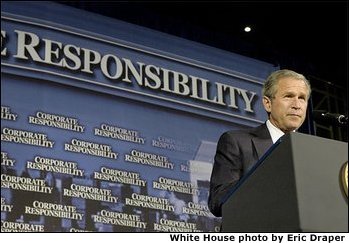
THE PRESIDENT THEN
“At this moment, America’s highest economic need is higher ethical standards–standards enforced by strict laws and upheld by responsible business leaders.”
—George W. Bush, July 9, 2002
“We are making broad and dramatic progress against corporate fraud in America. We’re defending our free enterprise system against corruption and crime. And we’re beginning a new era of corporate integrity. Corporate responsibility is essential to America. It’s essential to shareholders. It is essential to investors.”
—September 2002
Remarks by the President at Corporate Fraud Conference
Washington Hilton Hotel
Washington, D.C.
“Our country has made great progress in restoring investor confidence, and putting the recession behind us. We cannot be satisfied, however, until every corporate wrongdoer is held to account, and every part of our economy is strong, and every person who wants to work can find a job.”
—January 2003
Presidential radio address
“The president feels very strongly about the importance of promoting and focusing on corporate accountability, corporate responsibility. The president frequently talks about the responsibility era, and that applies to all in our society, including America’s corporations.”
—Ari Fleischer, July 2002
This has been a crisis in which the American people did not know that they could read a financial statement and believe that it was honest and accurate. And as a result of this legislation, as a result of the SEC’s order for recertification, I think the American people are going to see they can have more faith, more accuracy, and more reliability in the records of America’s corporations. And the corporate leaders certainly have been put on notice that if they violate the law, this government will prosecute them.”
—Ari Fleischer, July 30, 2002
***
THE PRESIDENT NOW
“Our entire economy is in danger.”
“I’m a strong believer in free enterprise, so my natural instinct is to oppose government intervention. I believe companies that make bad decisions should be allowed to go out of business. Under normal circumstances, I would have followed this course. But these are not normal circumstances.”
“The market is not functioning properly. There is a widespread loss of confidence. America could slip into a widespread financial panic.”
“I propose that the federal government reduce the risk posed by the troubled assets and supply urgently needed money so banks and other financial institutions can avoid collapse and resume lending.”
“I also understand the frustration of responsible Americans who pay their mortgages on time, file their tax returns every April 15th, and are reluctant to pay the cost of excesses on Wall Street. But given the situation we are facing, not passing a bill now would cost these Americans much more later.”


Widespread Panic > widespread financial panic.
Obv.
awesome post, otis. i just wish all of this wasnt true. i wish more were paying attention, and i wish i knew what to do about it.
To be fair, those were two very different issues. The first was about unadulterated corporate greed from the top down. There is some of that with the mortgage idiocy, but this time the greed also came from the bottom up. If more people would learn to live on what they earn, instead of on what they can borrow, this would not be happening. The banks were stupid for making the loans, but the people taking the loans were stupid for not being honest with themselves about what they could actually afford. I think I dislike most about the sentiment of all of this is that we the people are going into debt more, to clear bad debt of the books of banks, so banks can go right back out and start giving out more loans because people are having a hard time getting credit right now. Really?! Is more credit the key to our problems. Not in my mind, we need to figure out as a society how to stop keeping up with the Joneses.
Aaron is correct.
Maybe you should end your pity party and take advantage of one of the best times to invest. Warren Buffett does not go around throwing $5 billion at a whim.
And why not some quotes from Obama’s buddies that ran Freddie Mac and Fannie Mae? Bush wanted them to tighten up, not expand in 2002. But the Dems in Congress pushed for them to do so. Now Raines may end up with another cushy job with your guy.
Great post, Otis, and fantastic summary, Aaron- and I couldn’t agree more. I compare this bailout to motorcycle helmet laws– all it does is interfere with Darwinism. Forcing riders to wear helmets just keeps the stupid ones from getting weeded out of the gene pool when they crash. Saving the huge coporations and the idiotic, borrow-’till-I-drop consumers they preyed upon is just postponing the very “market correction” that Bush touted in the past. It will be interesting to see which hurts worse- all of us paying for these giant mistakes of others, or looking back in retrospect and seeing that nothing changed when we did. Otis, see you in one month! 🙂
…and Obama dons his superhero tights and cape and leaps to the foreground as his loyal followers chant loudly, “HERE HE COMES TO SAVE THE DAY!”
and we all live happily ever after
*sarcasm duly noted!*